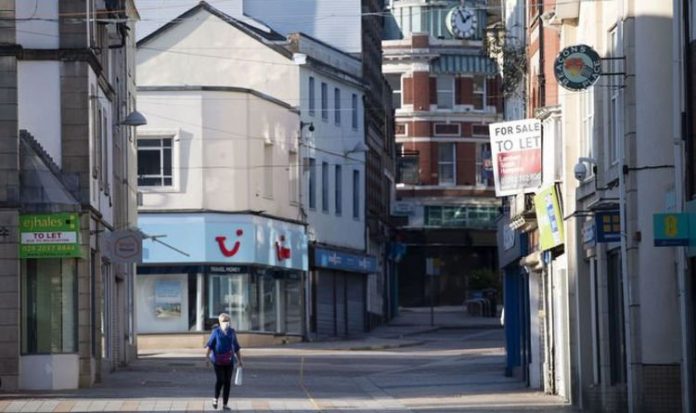The coronavirus pandemic has accelerated the trend of the demise of UK high streets. More than 125,000 jobs in the UK retail sector were lost in the first eight months of 2020. According to analysis by the Centre for Retail Research, 125,515 retail jobs have been axed while 13,867 shops have permanently shut across high streets, shopping centres and retail parks.
Data released by the Office for National Statistics (ONS) earlier this year further painted a grim picture for high streets, highlighting that retailers were already struggling before the pandemic.
The state of the high street has caused concern for at least a decade.
In that time the government has commissioned several reviews of how to make it more sustainable.
One vision of the high street was predicted by Mark Littlewood, the director-general of the Institute of Economic Affairs (IEA), who told Express.co.uk Britons might see new “leisure destinations”, all-in-ones, pop up around the country.

UK coronavirus: The high street could be transformed into all-in-one ‘leisure destinations’ (Image: GETTY)

Retail sector: Some 125,000 were lost in retail in the first eight months of 2020 (Image: GETTY)
He said: “With mass closures, we’re probably going to see a move towards places being turned into leisure destinations.
“Areas in London, for example, might become a bit more like the South Bank.
“Rather than continuing to go to the high street in a very old fashioned way, I think we’ll go down a route where people go to a particular area because there’s a cinema and a bowling alley, and five nice restaurants, and some clothes shops and maybe a book store too.
“Out of town shopping centres were the first iteration of it but there’s no particular reason why high streets can’t adapt in that sort of way.
JUST IN: Pizza Hut closing 29 restaurants across the UK

UK rents: Many shops have defaulted on rent payments on leases lasting as long as 25 years (Image: GETTY)
“So I think we might well see city centres and high streets becoming the place you go to for leisure in general in which one element is shopping.
“This might very well be a good thing for society and the economy.”
COVID-19 is not solely to blame for the colossal job numbers lost in the retail sector.
Last year, around a third of the job losses were due to companies going bust: others were due to slimming down, and shedding less profitable units.
DON’T MISS
Pret closing: Pret A Manger permanently closes 30 stores – full list [REPORT]
Metro Bank: The top savings and ISA rates available to Britons [ANALYSIS]
Britons REJECT eye-watering £20bn tax hike to fund COVID-19 recovery [INSIGHT]

Rishi Sunak: The Chancellor has employed several strategies in a bid to curb the economic fallout (Image: GETTY)

Debenhams: The department store closed a slew of shops across the country during lockdown (Image: GETTY)
The forecast for this year – 243,000 fewer retail jobs – was based on data available in the early weeks of lockdown, so it did not take account of it lasting longer than first expected.
Customer habits were already shifting, many now shopping online, with retailers such as Amazon and Ocado.
Lockdown measures were eased in England in June, with many rushing out to physically visit the shops for the first time in months.
However, even as they re-opened, shops are having to contend with lower footfall, and infection controls constraining numbers and interaction in stores.

Furlough scheme: Furlough pay has helped many high street vendors stay afloat (Image: Express Newspapers)
Many high street names are now being forced to “restructure” – but this process is lengthy, with shop bosses having to decide where they will pull back branches around the country.
Added to this is the weariness about the return of workers to the office – with retail bosses in the dark about whether inner-city stores will ever reach pre-COVID customer numbers.
Retailers also have the additional problem of securing rent agreements with their landlords – many of which are long leases of up to 25 years.
Despite a fairly bleak picture, some have predicted that retail may completely bounce back, gradually becoming used to the new restrictions.

London South Bank: London shopping areas could come to resemble the South Bank (Image: GETTY)
Patrick Minford, Professor of Economics at Cardiff University, who wrote in The Daily Telegraph last month struck a lighter note.
He argued: “There will be much less change than current fashion would have you believe.”
Instead, the high street might, in fact, bounce back, with retailers enjoying the easing of lockdown, with June’s retail sales figures from the British Retail Consortium revealing how, actually, all have recovered their losses to show 3.4 percent growth in June a year ago.
As Prof Minford noted: “That is remarkably V-shaped, after the precipitous drop under lockdown.”
Retail sales rose again in July, but shops continued to make up for ground that was lost during the lockdown.







